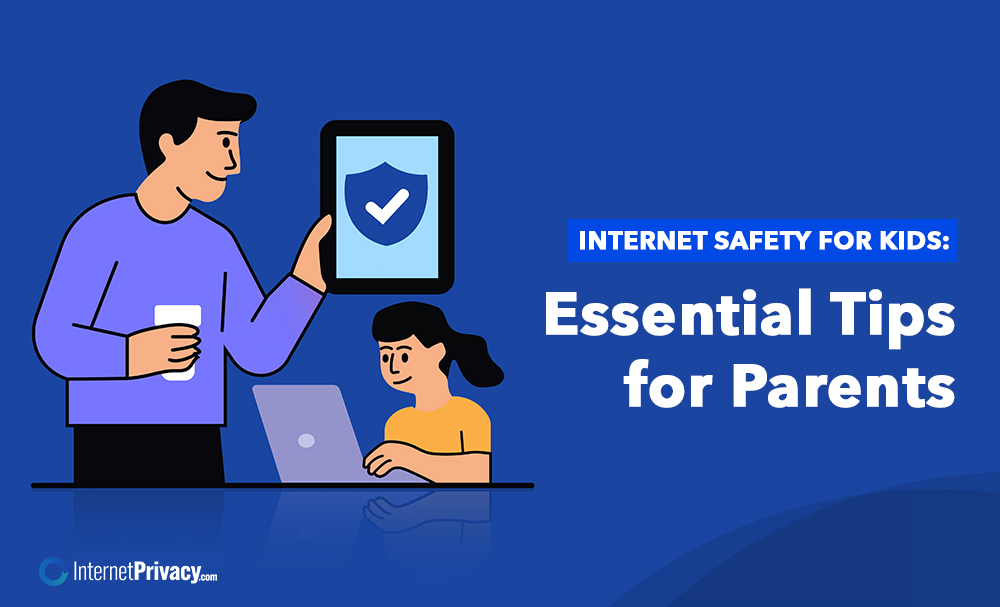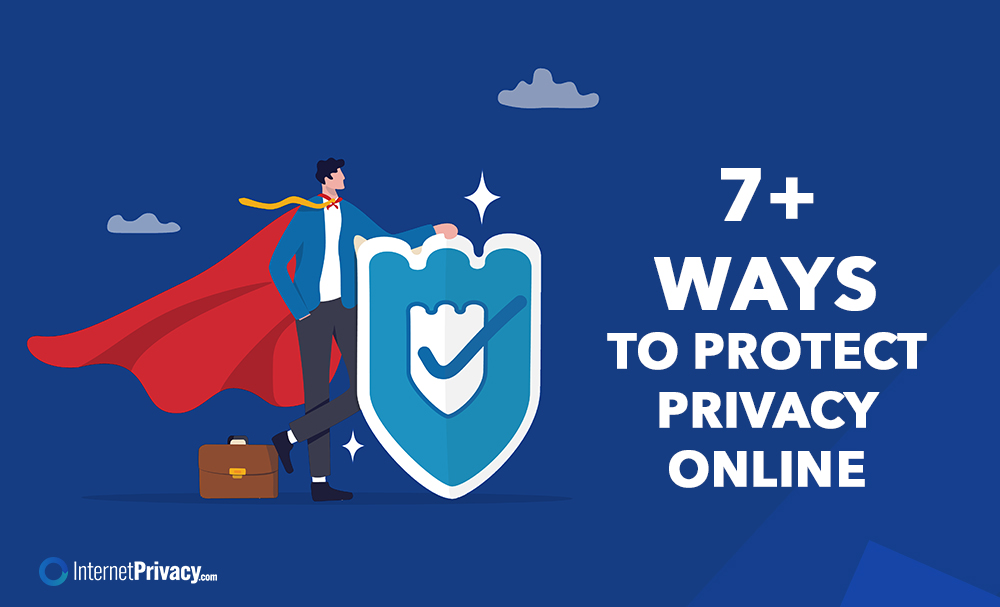Internet Safety for Kids: Essential Tips for Parents in 2026

This article will discuss internet safety for kids and the importance of keeping your kids protected online.
Teaching young kids about internet safety is paramount. Parents are crucial in preparing their children to navigate the online realm securely. This involves establishing guidelines, educating them about cyberbullying and online threats, and setting boundaries.
In this article, we’ll delve into the significance of internet safety, offer key advice for parents, address common child concerns about online spaces, discuss effective communication strategies, and provide resources for further education. Let’s make safeguarding our children’s online experiences a priority in 2026.
Our internet privacy experts will protect you and your family from online threats. Call us at 866-349-0130 for more information.
The Importance of Teaching Kids About Internet Safety

Parents and educators play pivotal roles in shielding children from online dangers like cyberbullying and predators. Educating kids about potential risks of the online world empowers them to navigate the digital landscape responsibly. Monitoring kids’ online activities and implementing parental controls are essential to creating a secure and safe online environment. Together, parents, educators and other trusted adults can safeguard children from various online threats.
Why Is It Important for Parents To Be Involved?

Parents’ active involvement in their children’s online activities is vital for ensuring their safety in the digital realm. Implementing parental controls and providing practical advice on internet safety are effective measures to protect children’s personal information and promote responsible digital use.
Clear boundaries, such as setting screen time limits, help prevent excessive internet use and exposure. Monitoring social media interactions lets parents intervene if worrisome behavior or content arises.
Educating children about online privacy, including avoiding sharing personal information and interacting with strangers, is crucial for fostering a safe online environment. Maintaining open communication channels where kids can freely discuss their online experiences and concerns builds trust and facilitates ongoing monitoring.
What Are the Dangers of the Internet for Kids?

The internet presents various risks to kids, including online bullying, exposure to inappropriate content while playing online games, and privacy threats like identity theft. Online bullying can profoundly affect a child’s mental well-being and self-esteem, while exposure to inappropriate content in online games can cause confusion and distress.
Identity theft risks can lead to financial loss and lasting repercussions for families. Parents and guardians should educate kids about creating strong passwords, refraining from sharing personal information, and exercising caution when interacting with strangers online to counter these dangers.
We offer monitoring and removal of your personal information online so you can better protect your identity and the identities of your family members. Contact us today at 866-349-0130 to learn more.
4 Top Internet Safety Tips for Parents

Key digital safety measures for parents to take include utilizing parental control software, overseeing online interactions, and establishing guidelines for instant messaging usage. It’s also essential to teach kids to make smart decisions online, like never sharing sensitive details like their address, phone number, or school name.
It is crucial to encourage open dialogue where children can freely discuss their online encounters with parents or trusted adults. Educating children about the risks of engaging with strangers online and emphasizing the importance of never arranging to meet someone they’ve only encountered virtually are vital steps.
1. Set Digital Safety Rules and Boundaries
Setting rules and boundaries for children’s internet usage ensures they stay safe during their time online. Establishing clear guidelines provides a framework for safe online behavior.
Educational materials, like lesson plans focused on internet safety, empower parents and children with the knowledge to navigate the digital world securely. Teaching your kids about the dangers of sharing personal information via online communication can significantly mitigate the risk of cyber threats and real-life threats.
2. Educate Your Child about Online Privacy
Parents and educators guide children in the digital age by helping them develop healthy relationships with technology. Educating children about online privacy is vital to protecting their personal information. For example, teaching them to keep details private and recognize scams on social media platforms is crucial for online safety.
3. Monitor Your Child’s Time Online
Monitoring your child’s online activity is a proactive approach to ensuring internet safety. Parental controls filter content, limit website access, and track activities for red flags. They also enable parents to set up user accounts, apply age restrictions, and monitor mobile device social networking sites and media usage.
Managing screen time involves setting clear usage guidelines and balancing time online with other activities. Establishing device-free zones like bedrooms aids in reducing screen exposure.
4. Teach Your Child about Cyberbullying
Educating children about cyberbullying is vital for helping them recognize and respond to online harassment. Parents can achieve this by discussing the impacts of digital bullying and helping them identify harmful online content.
Empowering children with this knowledge protects them from cyberbullying and enhances their digital literacy and awareness. Furthermore, parents should encourage their children to speak up if they experience being bullied online, and reassure them that help and support are available.
3 Common Internet Safety Concerns for Kids

Children commonly face internet safety concerns such as online predators, exposure to inappropriate content, and risks of identity theft. Parents must address these issues proactively to safeguard their children in the digital realm.
Online predators exploit children through various platforms, making it crucial for parents to educate their kids about recognizing warning signs and maintaining communication. The widespread availability of inappropriate content online necessitates implementing parental controls, setting strict rules, and monitoring screen time to protect children from encountering harmful material.
Identity theft is a significant risk, with young individuals often unknowingly sharing personal information. Encouraging safe online behavior, emphasizing privacy, and teaching responsible sharing are essential steps parents can take to mitigate this risk and keep children safe online.
We work on behalf of our clients to monitor online data and remove personal information from the internet. Give us a call at 866-349-0130 to learn more.
1. Cyberbullying
Cyberbullying poses a significant threat to children’s online safety, causing emotional distress and potential harm. Parents can support their children in combating cyberbullying by addressing instances of online bullying and offering practical advice.
The impact of cyberbullying on a child’s mental and emotional well-being can lead to issues like anxiety, depression, and low self-esteem. Parents must educate themselves and their children on identifying harmful content and behavior and keeping children safe online.
2. Online Predators
The presence of online predators presents a significant threat to children’s safety, necessitating parents’ proactive efforts to educate and shield them from potential dangers in the online realm. Parents can mitigate the risk of children falling victim to online predators by teaching safety tips, establishing boundaries for online interactions, and initiating conversations.
Parents need to set clear rules regarding sharing personal information and whom children can interact with online while monitoring their online activities to ensure adherence to proper internet behavior. Emphasizing the importance of privacy and discouraging children from sharing personal details with strangers or engaging in online games are crucial aspects of parental guidance. Furthermore, kids should know to never post photos online.
Encouraging communication through moderated platforms and advocating for reporting suspicious behavior further enhances children’s safety by minimizing the chances of interacting with individuals with malicious intentions.
3. Exposure to Inappropriate Content
Children may encounter inappropriate online content, including harmful websites and materials that jeopardize their safety. One of the best ways to prevent this from happening is by setting up parental controls on digital devices and on the platforms that your children use.
Since certain ages can access more content than others, you can fine-tune parental controls based on the age of the kids. For example, very small children should have much less access to online content than teenagers.
Monitoring their internet usage will also clue you in to the types of content they consume and sites they frequent. From there, you can have a better idea of their risk level online and what additional digital safety parameters you need to set up.
How To Talk to Your Child About Internet Safety

Initiating conversations with your child about internet safety is essential for building a culture of open online communication and trust. Parents can discuss the importance of protecting personal details, address social media interactions, and highlight the risks of cyberstalking to equip their children with digital citizenship skills.
Introducing the topic through age-appropriate discussions using real-life examples or scenarios is effective. Encouraging children to ask questions and express concerns creates a safe space for dialogue. Emphasizing “think before you click” helps children grasp the permanence of online actions and the impact of sharing sensitive personal information.
Resources for Parents To Learn More About Internet Safety

Parents have access to various resources to bolster their understanding of internet safety and effectively safeguard their children online. Net Nanny and Qustodio are recommended parental control tools for monitoring and setting restrictions on children’s online activities.
Websites like Common Sense Media offer valuable educational resources on digital citizenship and online safety, too. Plus, collaborating with educators is key to creating a safe online environment.
Parents should also educate themselves on identity theft prevention strategies, such as safeguarding personal information and recognizing phishing scams.
At InternetPrivacy.com, we offer data removal services to get rid of your personal information and help you protect your identity and the identities of your loved ones. Our services include deep web scans, data removal, ongoing monitoring and detailed reporting.
Call us at 866-349-0130 for a free consultation.
Last updated 12/2025





